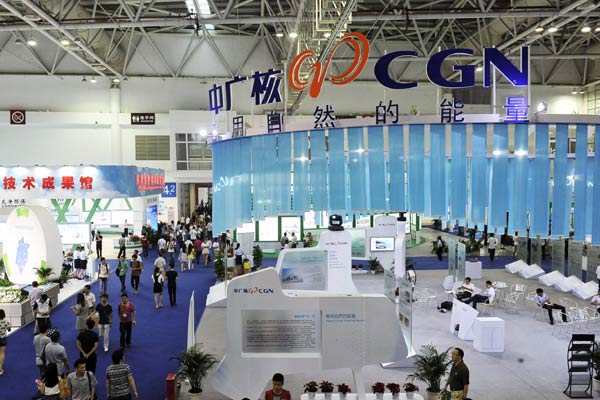CGN, Kazakh nuclear firm sign uranium pact
By LYU CHANG (China Daily) Updated: 2014-12-16 09:31
 |
|
China General Nuclear Power Group's booth at a recent exhibition in Fuzhou, capital city of Fujian province. CGN, the country's largest nuclear plant operator in terms of installed capacity, plans to set up a joint venture in Kazakhstan to produce nuclear fuel assemblies, which will ensure sufficient supplies as Chinese firms seek to go global. [Provided to China Daily] |
China General Nuclear Power Group has signed a deal with Kazakhstan's government-owned Kazatomprom for the joint exploration of uranium for nuclear fuel, a step that will help Chinese nuclear companies become self-sufficient in the fuel cycle.
The strategic agreement was signed during Premier Li Keqiang's meeting with his Kazakh counterpart Karim Masimov on Monday.
CGN, the country's largest nuclear plant operator in terms of installed capacity, plans to set up a joint venture in Kazakhstan to produce nuclear fuel assemblies, which will ensure sufficient fuel supplies as Chinese nuclear companies seek to go global, CGN said in a statement.
Since 2006, CGN has been involved in the uranium market in Kazakhstan, which has 15 percent of the world's uranium resources and an expanding mining sector.
Semizbay-U LLP, a joint venture formed by the two companies in 2009 to explore the Irkol and Semizbai uranium deposits, has become a major uranium supplier for China's nuclear stations.
CGN said that so far, the JV has shipped about 6,000 metric tons of natural uranium to China. It has purchased huge amounts of uranium from Kazatomprom in deals valued at more than $1 billion.
CGN Power Co Ltd, a subsidiary of CGN, went public in Hong Kong last Wednesday, raising about $3.2 billion in the city's biggest initial public offering in two years.
China, the world's largest energy consumer, is also one of the largest nuclear markets with huge potential for growth, experts said. The latest deal will help Chinese nuclear giants explore the domestic and overseas markets.
Pan Chao, a senior analyst at PC Investment Co Ltd, said that China will have huge demand for nuclear fuel supplies, given its plans to expand nuclear generation as it seeks to reduce emissions from fossil fuels.
"The two countries have many common interests in that respect," he said.
In 2013, Kazakhstan became the world's major uranium producer, accounting for 38 percent of global output. It has a major plant that makes nuclear fuel pellets, and it aims eventually to sell value-added fuel rather than just uranium, according to the World Nuclear Association.
CGN operates 64 percent of China's nuclear power plants with an installed capacity of 11.6 million kilowatts. It accounts for 51 percent of the nuclear power plants that are under construction, according to a CGN statement.
China has 21 reactors in operation at eight sites and 27 are under construction, the largest number of nuclear power plants in the world, according to the National Energy Administration.
- Cash crunch fans expectation on RRR cut
- US extends antidumping duties on China's thermal paper
- Modern food van with ancient look in Shanghai
- China home prices continue to cool in November
- Asia's top 3 billionaires all Chinese
- Old investment remedy the treatment for China's "new normal"
- China's solar sector opposes US anti-dumping ruling
- BMW to recall 846 cars in China
















